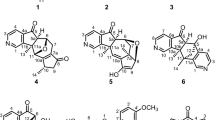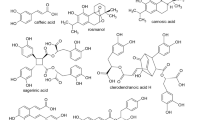Abstract
α-PICOLINE has been isolated from the leaves of the dock, Rumex obtusifolius L. There are isolated instances where pyridine and simple derivatives have been found to occur in Nature, for example, pyridine in Aplopappus hartwegi 1 and 3-methoxypyridine in Equisetum arvense 2. This would appear to be the first record of the presence of α-picoline in a natural source. The base was isolated in 0.1 per cent yield from an aqueous extract of the leaves and characterized as its hydrochloride (m.p. 200° anhydrous), picrate (m.p. 165–166°) and methiodide (m.p. 226–227°).
This is a preview of subscription content, access via your institution
Access options
Subscribe to this journal
Receive 51 print issues and online access
$199.00 per year
only $3.90 per issue
Buy this article
- Purchase on Springer Link
- Instant access to full article PDF
Prices may be subject to local taxes which are calculated during checkout
Similar content being viewed by others
References
Buchrer, Mason, and Crowder, Amer. J. Pharm., 111, 105 (1939).
Manske, and Marion, Can. J. Res., B, 20, 87 (1942).
Author information
Authors and Affiliations
Rights and permissions
About this article
Cite this article
WILKINSON, S. α-Picoline from Rumex obtusifolius L.. Nature 181, 636–637 (1958). https://doi.org/10.1038/181636a0
Issue Date:
DOI: https://doi.org/10.1038/181636a0
This article is cited by
-
Occurrence of α-Picoline in Plants
Nature (1958)
Comments
By submitting a comment you agree to abide by our Terms and Community Guidelines. If you find something abusive or that does not comply with our terms or guidelines please flag it as inappropriate.



